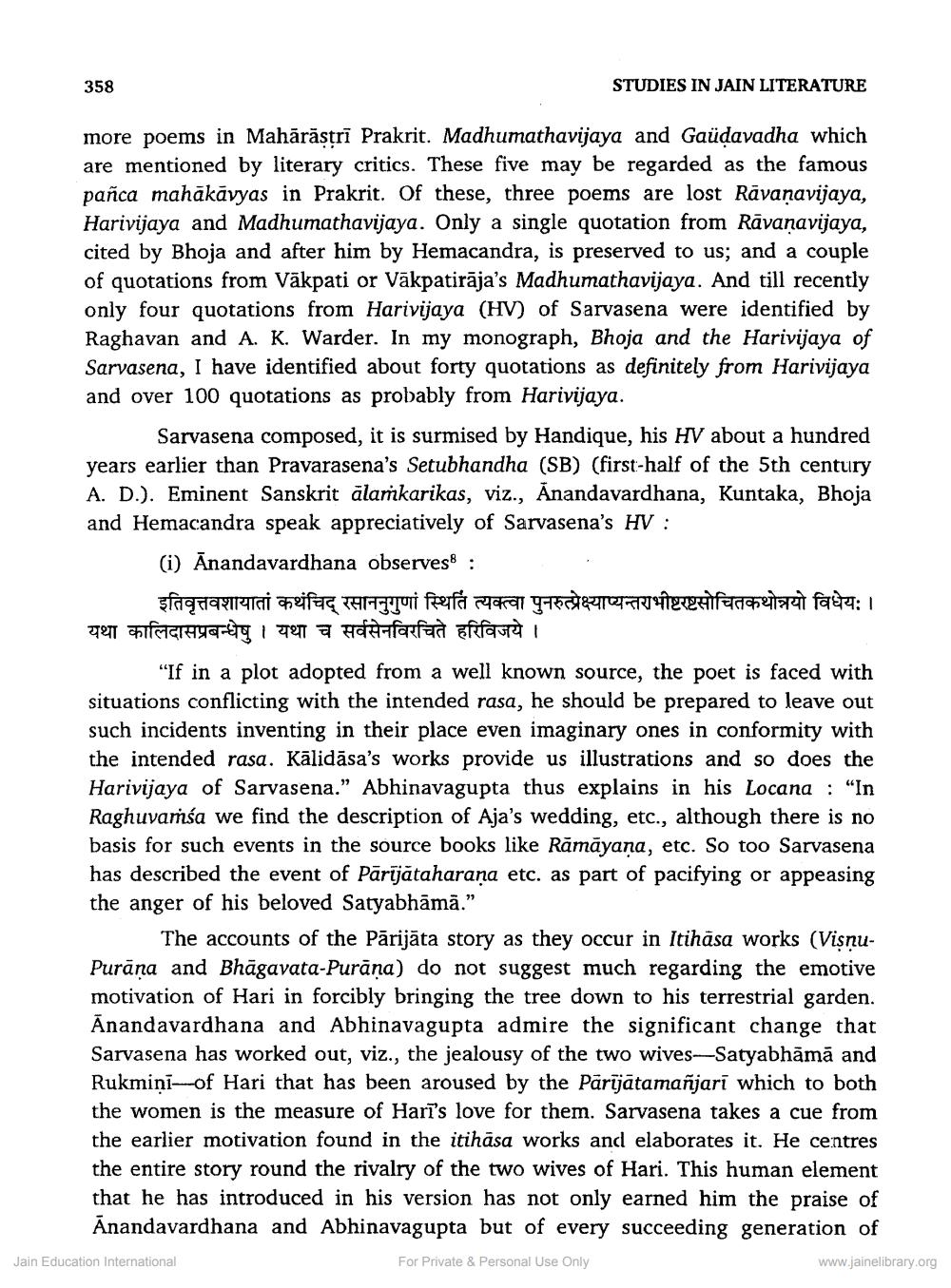________________ 358 STUDIES IN JAIN LITERATURE more poems in Maharastri Prakrit. Madhumathavijaya and Gaudavadha which are mentioned by literary critics. These five may be regarded as the famous panca mahakavyas in Prakrit. Of these, three poems are lost Ravanavijaya, Harivijaya and Madhumathavijaya. Only a single quotation from Ravanavijaya, cited by Bhoja and after him by Hemacandra, is preserved to us; and a couple of quotations from Vakpati or Vakpatiraja's Madhumathavijaya. And till recently only four quotations from Harivijaya (HV) of Sarvasena were identified by Raghavan and A. K. Warder. In my monograph, Bhoja and the Harivijaya of Sarvasena, I have identified about forty quotations as definitely from Harivijaya and over 100 quotations as probably from Harivijaya. Sarvasena composed, it is surmised by Handique, his HV about a hundred years earlier than Pravarasena's Setubhandha (SB) (first-half of the 5th century A. D.). Eminent Sanskrit alamkarikas, viz., Anandavardhana, Kuntaka, Bhoja and Hemacandra speak appreciatively of Sarvasena's HV : (i) Anandavardhana observes8 : इतिवृत्तवशायातां कथंचिद् रसाननुगुणां स्थिति त्यक्त्वा पुनरुत्प्रेक्ष्याप्यन्तराभीष्टरष्टसोचितकथोन्नयो विधेयः / यथा कालिदासप्रबन्धेषु / यथा च सर्वसेनविरचिते हरिविजये / "If in a plot adopted from a well known source, the poet is faced with situations conflicting with the intended rasa, he should be prepared to leave out such incidents inventing in their place even imaginary ones in conformity with the intended rasa. Kalidasa's works provide us illustrations and so does the Harivijaya of Sarvasena." Abhinavagupta thus explains in his Locana : "In Raghuvamsa we find the description of Aja's wedding, etc., although there is no basis for such events in the source books like Ramayana, etc. So too Sarvasena has described the event of Parijataharana etc. as part of pacifying or appeasing the anger of his beloved Satyabhama." The accounts of the Parijata story as they occur in Itihasa works (VisnuPurana and Bhagavata-Purana) do not suggest much regarding the emotive motivation of Hari in forcibly bringing the tree down to his terrestrial garden. Anandavardhana and Abhinavagupta admire the significant change that Sarvasena has worked out, viz., the jealousy of the two wives-Satyabhama and Rukmini-of Hari that has been aroused by the Parijatamanjari which to both the women is the measure of Hari's love for them. Sarvasena takes a cue from the earlier motivation found in the itihasa works and elaborates it. He centres the entire story round the rivalry of the two wives of Hari. This human element that he has introduced in his version has not only earned him the praise of Anandavardhana and Abhinavagupta but of every succeeding generation of Jain Education International For Private & Personal Use Only www.jainelibrary.org




